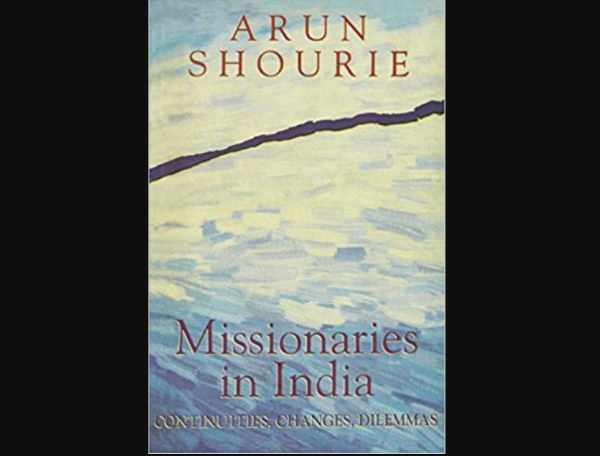INSIGHT XXIV: Reality of Christian missionaries through the lens of Arun Shourie's book
Namaskar, the new series "INSIGHT" is an attempt to present the central thought of a thought-provoking book. "Missionaries In India Continuities, Changes, Dilemmas", a book by Shri Arun Shourie compels readers to contemplate various points put forth.
Total Views |
Church always worked to serve the imperial interest and equated Indian Nationalism with Hindu Nationalism purposely. Universalism advocated by Hindu philosophy was ridiculed as a "utopian expectation of non-christian religion". As it would have neglected the transnational character of Christianity.
The Vatican council was almost an European affair. The question was raised in the Pune review, that who was to coordinate the work of proclamation in India? Basically, all were obliged to accept any document issued from Rome. ( Same is the case with the communist parties, opined the author, with the only difference that authority is with Moscow and Peking. )

The author states that contextualisation and localization are essential, so is the national character of Church. It was pointed out by Cardinal Josef Tomko in his address in 1991.
Localization results in a dilemma, if it is sought, it faces the consequences of getting absorbed. If not ,it creates some issues of othering and getting alienated. Engagement between Christian Gospel and a particular culture was in a way necessary, but it implied the danger of losing the core identity. The Pune review concluded that these two concepts though seem opposite to each other, have to go hand in hand.
One can see some bizarre logic in some conventions too. The idol of Vishnu is criticised but not the idol of mother Mary, turning beads in the Church is criticized, but not clutching the Cross. The notion of caste is not acceptable, but the Church demands reservation to be extended to scheduled caste Christians. ( The demand is still made ) It is suggested in the report, some traditions of the tribals and scheduled castes should be adopted by Church, of course, there is not much clarity on this point.
The author observed some changes in the ways the Church dealt with the situation after independence.
1) It moved from the false interpretations to empathy.
2) It claimed to be the only way to Truth, but later it expressed inclusivity.
3) From uniformity as the starting point,but it moved to ' contextualisation ' later.
Thus started a series of Dilemmas. What would help us understand the change in position on some issues ?The author suggested some tests. He stated them clearly.
• If the Church listed all the disinformation points, and their grounds accompanied by enumerating the motives,it would prove the point.
• If the Church explained with the help of scholarly work already done,the claims of Bible, being the revealed words of God and Pope's being infallible.
• If the Church spreads information or knowledge based on science to its target groups
• If the Church wholeheartedly accepted the fact that there are many ways to reach God and truth, and the process as inner-directed search.
• If the Church accepted salvation was possible in each religion,then it had to explain ground for converting people, specially the way it was done in the North-East.
The Vatican council was almost an European affair. The question was raised in the Pune review, that who was to coordinate the work of proclamation in India? Basically, all were obliged to accept any document issued from Rome. ( Same is the case with the communist parties, opined the author, with the only difference that authority is with Moscow and Peking. )

The author states that contextualisation and localization are essential, so is the national character of Church. It was pointed out by Cardinal Josef Tomko in his address in 1991.
Localization results in a dilemma, if it is sought, it faces the consequences of getting absorbed. If not ,it creates some issues of othering and getting alienated. Engagement between Christian Gospel and a particular culture was in a way necessary, but it implied the danger of losing the core identity. The Pune review concluded that these two concepts though seem opposite to each other, have to go hand in hand.
One can see some bizarre logic in some conventions too. The idol of Vishnu is criticised but not the idol of mother Mary, turning beads in the Church is criticized, but not clutching the Cross. The notion of caste is not acceptable, but the Church demands reservation to be extended to scheduled caste Christians. ( The demand is still made ) It is suggested in the report, some traditions of the tribals and scheduled castes should be adopted by Church, of course, there is not much clarity on this point.
The author observed some changes in the ways the Church dealt with the situation after independence.
1) It moved from the false interpretations to empathy.
2) It claimed to be the only way to Truth, but later it expressed inclusivity.
3) From uniformity as the starting point,but it moved to ' contextualisation ' later.
Thus started a series of Dilemmas. What would help us understand the change in position on some issues ?The author suggested some tests. He stated them clearly.
• If the Church listed all the disinformation points, and their grounds accompanied by enumerating the motives,it would prove the point.
• If the Church explained with the help of scholarly work already done,the claims of Bible, being the revealed words of God and Pope's being infallible.
• If the Church spreads information or knowledge based on science to its target groups
• If the Church wholeheartedly accepted the fact that there are many ways to reach God and truth, and the process as inner-directed search.
• If the Church accepted salvation was possible in each religion,then it had to explain ground for converting people, specially the way it was done in the North-East.



